The longer I play D&D, the more I see examples of character classes affecting patterns of behavior, and these portrayals strangely align with the 12 Jungian archetypes.
Today’s character classes found within most TTRPGs perpetuate the problem (which is why I decided to forgo them when I created my own homebrew system). I’ve been playing Dungeons and Dragons for two decades. In that time, I’ve come across many players, and many unique characters cooked up over late night hot pockets and existential contemplation.
Nowadays, if I’m in an average group of five people, I can easily guess how they’ll play their character based on the player’s personality, and the character class they choose.
“So what?” you might ask.
Well, first, that hurts my pride as both a novelist, and a player and purveyor of this fine hobby. Not that you’d care, you monster.
But I, for one, have seen the upper echelon of what player interaction and the storytelling opportunities that arise from it look like, and I’d really rather not see the same scenes repeat themselves.
Part of it seems to stem from players’ inability to subconsciously separate the names classes employ from the cliche archetypes they naturally summon. The following is an analysis of 12 classes from Dungeons and Dragons paired with the closest Jungian archetype. I’m going to be making a lot of large sweeping generalities. These are not the only ways I see these classes played, just the most common, cliche way I see them played.
The 12 Jungian Archetypes
Caregiver
Creator
Everyman
Explorer
Hero
Innocent
Jester
Lover
Magician
Rebel
Ruler
Sage
Browse by Character Class
Barbarian
Bard
Cleric
Druid
Fighter
Monk
Paladin
Ranger
Rogue
Sorcerer
Warlock
Wizard
The Everyman
back to archetypes | classes
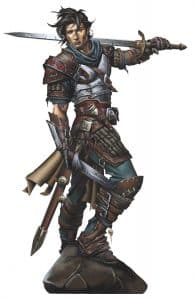
Character Class: Fighter
The everyman archetype is about belonging, blending, and being grounded. It’s about being so far removed from pretentiousness that it appeals to the widest audience possible.
A quick look at Dungeons and Dragons demographics will show you the most played character is… a human fighter.
Why? Because the human fighter is the most widely appealing. The character class is about becoming whatever it wants to be, and the human is about versatility, so the two go together like dwarves and ale.
Common Cliches
I’ve seen fighters played so many different ways, but almost always they fit the mold of the anchor, the player in the group who grounds the rest of the table.
Meanwhile, the wizard is off using prestidigitation on a mushroom to make it smell like pie, and the rogue is off trying to take the cleric’s holy symbol while she sleeps (again), but the fighter is sharpening his weapon, checking his armor, and calculating how many hit points he has left until his death.
He knows his job is to deal out punishment, and take it in equal measure. There’s no highfalutin grand design to his mechanics. It’s all about efficiency.
How to Mix it Up
While there’s nothing inherently wrong with wanting (and needing) this role filled, it doesn’t always need to be the fighter. For fun, let’s think about a fighter as the opposite role: an Agent of Chaos. When shit hits the fan, the Agent of Chaos spreads it around.
Got a fight to settle in your party? Punch both of them in the face. Bad guy giving a monologue? Throw your sword at them and start the encounter. Tired of boring builds where all you do is damage?
Try building your fighter to pull off as many combat maneuvers in combat as possible–push, pull, trip, disarm, grapple–and watch the dungeon master cry as his giant megapede with a +8 against trip suddenly finds itself on its back being stabbed by Bolar the Hucker. Remember, your new goal is to rock the boat… not steady it.
The Caregiver
back to archetypes | classes
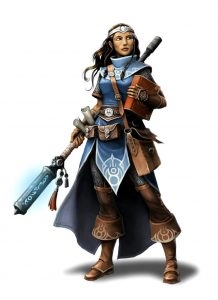
Character Class: Cleric
The caregiver archetype is about caring for others, protecting them, showing compassion, and all around being the “good guy.” Why does the cleric fit this archetype?
Well, duh. The cleric has been a class about babysitting the other characters since its conception. Often this is at the expense of the player’s own fun, hence another of the caregiver’s signature traits–martyrdom.
Such a self-sacrificing attitude is totally indicative of the caregiver Jungian archetype. Some people really get their jollies by pumping hit points back into their nearly-dead teammates, others do it because it’s a necessary role that someone has to take otherwise the party will face a terrible death very early on.
Common Cliches
Normally, when I see a cleric played, they have three priorities.
The first is to make sure the front man or “tank” is full on hit points. The second directive is to make sure the party members closest to death also have plenty of health. The third is to make sure they don’t die.
Fun is nowhere near those priorities. Often times, a cleric will need to sacrifice their entire turn providing for another character instead of doing what they want to do, even if they have a better idea, because their role demands it. This can lead to, “I heal the fighter. I end my turn.”
How to Mix it Up
As I mentioned before, some people take pleasure from helping others, and that’s fine, but my idea for a cleric that breaks this mold is equal parts selfish asshole and invaluable member of society: the Healmonger.
As a Healmonger, you take the toughest armor, the biggest weapon (preferably your god’s favored weapon to get bonuses with it), spells that make you fight better with bonuses to armor class, or damaging spells, and of course, a few necessary healing spells. Then, you crush the skulls of your enemies.
If one of your man-child party members manages to do something stupid like take an axe to the face, you charge them gold to get one of your turns, and you remind them that the best form of crowd control is killing the enemy. That’ll make them think twice before begging you for a heal, and you get to play with all those delicious divine spells.
The Rebel
back to archetypes | classes
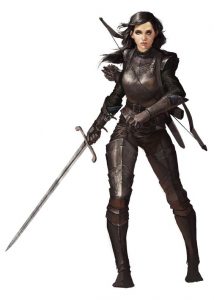
Character Class: Rogue
Who could have predicted this? I mean, it’s in the freaking name. Every rogue might as well come with a patch sewn into their coin purse that reads, “breaking rules, and stealing your shit since ye olde times.”
People who play rogues don’t make them to play with the rest of the group, they make them to play up the fantasy of being the lone wolf who cries “viva la revolucion!”
The rebel or outlaw archetype is all about disrupting power structures, changing stagnant or non-functional systems, and bringing freedom to those who are shackled by oppressive governments or restrictive rules.
Common Cliches
Most rogues that I see are played in a way that emphasizes one of these dynamics, usually the disruptive side. And, generally, that disruption isn’t directed at the environment or opposing forces, it’s directed at their own party members.
When there’s a rogue in the party, the rest of the group generally knows to keep one eye open while they sleep, because a person playing a rogue can’t help but stick their hands into a few coin purses or backpacks when they’re not welcomed in the name of their “chaotic neutral” nature–the easiest alignment to justify being a huge douche with. When not causing party conflict with their thieving ways, rogue players like to turn their attention to breaking as many rules or going into as many places their not welcomed as possible.
While this does cause a disruption of political structure by diverting the resources of a particular town (i.e. guards), this almost always results in yet another disruption in the party, and one of the most overplayed scenarios in Dungeons & Dragons, “everyone goes to jail.”
How to Mix it Up
So, forget that. Why play a rogue as a dissenting agent of discord and trickery? There’s so much of that in the world already. Why not play a good guy rogue? Imagine, if you will, a rogue who uses his powers for the betterment of the team as a whole, and who contributes to society by employing his talents for people who need them most desperately? You don’t have to do it for free, of course, that’s just silly. But what if you could be the Lever?
As the Lever, you use feints to open opportunities for your teammates to deal damage, use your skills to grant them bonuses, take teamwork feats to grant bonuses, and use magic device to replace the cleric in a clutch. As the Lever, you’re always useful, and you can quickly become the driving force behind the success of your party.
For even more roleplaying opportunities, choose a cause that your character believes in wholeheartedly. If that’s overthrowing an established government, build a rebellion. If that’s helping orphans, build a network of foster parents or trusted investors… or turn them into highly-trained assassins… your call!
The Sage
back to archetypes | classes
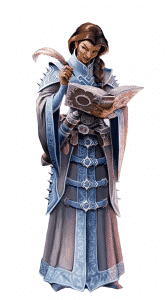
Character Class: Wizard
Ah, yes. The Sage. The fountain of patience, intelligence, and understanding.
To the sage, knowledge is everything, and what better character class to express this than the wizard? After all, part of their whole shtick is learning, memorizing, and preparing spells to cast. You can’t really do that without an knowledge of arcane secrets and a penchant for staying up hundreds of hours pouring over books you probably can’t even read.
It’s a perfectly logical combination that has existed since the dawn of modern fantasy.
Common Cliches
With few exceptions, when someone wants to play a wizard, this is the exact image they hold in their head and, for some reason, fantasize playing. It’s such a tired trope, but generally effective as the player is able to seamlessly blend the optimized mechanics of the class with their desire to be boring and refuse character interaction in the name of reading a book.
Players often don’t realize that interesting people read books too, and sometimes they read better books. If a wizard came up to me and asked if I wanted to know about the rise and fall of Berkakania, and the implications of its sudden disappearance, I would say no.
But if a badass wizard came up to me and said that he’d just finished a fascinating read on how the stewards of Berkakania beheaded their leaders and stole all the magic, I’d be like, “yeah, tell me about that.” By the way, most of the search results on Google for “badass wizard” are still frail old men in robes. What the hell?
How to Mix it Up
Okay, so let’s throw this image in the garbage. It’s absolute trash. Let’s make a new wizard unconstrained by the notions of knowledge. I want to see a Spelljacker.
Think about this. What if you met a wizard so impatient that instead of reading a bunch of tomes and books and stuff they just decided to steal the knowledge instead? A roguishly handsome fellow with a cool cape using his magical skills to break into other wizard’s houses and stealing all their knowledge. But, that involves reading, you say? Not if that info is on a scroll. Just whip that bad boy out, pass an arcana check, and boom, you got it.
And if, for some reason, the wizard you’re stealing from is using the old tired trope, you can just drop the book off with an NPC that can read magic, or have one of your party members read the important bits to you. After all, Spelljacker don’t have time to read.
The Creator
back to archetypes | classes
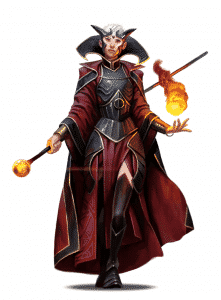
Character Class: Sorcerer
The motto of the creator Jungian archetype is “if you can imagine it, it can be done.” Unlike wizards, sorcerers seek to have an artistic control over their magics, and focus more on how a spell can be implemented in multiple capacities, rather than try to come up with a case-by-case method for dealing with problems.
As a creator, the sorcerer seeks to utilize their limited number of spells to their greatest extent, often having to become creative to work around limitations. The sorcerer is another of those classes, like the fighter, that tries too hard to do everything.
There are archetypes and class options out there to make a single-class party completely viable if running nothing but sorcerer.
Common Cliches
So, what’s the cliche that plagues the class with so many choices at its disposal it’s mind-numbing? The concept of magic blood. Seriously, every sorcerer I can think of playing with has used this same reasoning to justify their powers, and has developed their character around that single class feature/mechanic.
Most sorcerers play the same regardless of how their respective players utilize their powers–which is most often as an elemental embodiment. Fire, ice, lightning, acid, it doesn’t matter what element it is, there’s a sorcerer built around it because it’s what’s in their blood. Since the magic blood’s inception in Pathfinder, it’s been the norm, and it’s a little tiring. I guess since the wizards study, and the warlocks get their powers from another being, all the bases were taken?
Still, the personalities of these sorcerers seem to all mesh into the two categories, “my blood is better than yours,” or “my magic do the talking.” It’s the latter of these two that often creates the problematic aspects of the class’s cliche. Just because the sorcerer is supposed to use his spells in more than one instance, does not mean they should use the same spell for all problems. The biggest offender? Fireball.
How to Mix it Up
I’ve run out of fingers and toes to count the number of sorcerer’s I’ve played with whose sole personality trait was “I really like fire.” Like, okay, I get it. You’re the living embodiment of arson. Calm down.
I’d much rather see a sorcerer with magic themed around a way of life. This leads me to the Magic Mariner. The Magic Mariner is a sorcerer who got their powers by being around the ocean for a long time. Why not? Surely in a world of magic, someone could just develop the spontaneous powers to catch more fish, swim better, or dry themselves off instantly. Maybe they have magic in their blood, but who cares?
The magic mariner sure doesn’t. They’re down to earth (or water), and just want to use their magical abilities to help their party survive on their nautical journey around the high seas. You can develop a spell list for any profession, really. Just try it, and your blacksmith sorcerer will be specialized, useful, and unpretentious.
The Ruler
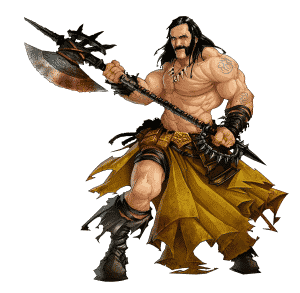
back to archetypes | classes
Character Class: Barbarian
The ruler desires power, pure and simple… perhaps too simple. They are controlling, authoritative, and uncooperative.
And while it is true that rulers desire to create prosperous communities, often times the means by which a ruler wants to reach those desires conflict with the ideals and goals of the other members of their group. Even so, the ruler will stop at nothing to achieve their goal.
It’s this single-mindedness that draws unfocused or lost people toward a ruler, and it is more often than not the reason a ruler falls from grace.
Common Cliches
The barbarian is the muscular powerhouse of all Frank Frazetta’s wet dreams. And ninety percent of them are played as big, bruising, idiotic bastards who only barely know what end of the sword to hit things with… sometimes not even that.
Sometimes, you just hit things with the blunt end of the sword, and they die anyways because you maxed your strength score at level one. Their single-mindedness manifests in a single-stat monstrosity that dumps charisma so they can roar at civilized people and be forgiven for it, and so that the barbarian’s player can play on their phone until combat starts.
Honestly, the other players are better off not letting that guy talk anyway.
How to Mix it Up
So, often with this barbarian trope, we also see a larger wisdom score that never gets played up, and usually it’s because we as Cheeto-devouring nerds don’t understand that wisdom is meant to represent the barbarian’s survival instincts. Either that, or the barbarian doesn’t have enough intelligence to articulate the fact that he’s smelling manticore urine in the forest–a piece of information that would be really helpful right about now.
Therefore I present the terrifying vision of the Headhunter. Not one of those guys that decapitates his enemies, but a hunter that uses his head to interpret the warning signs his instincts are giving him, and be able to articulate that information with his group. Better yet, use his wisdom to find monster weaknesses, and then figure out how to exploit them with his intelligence. The reason mankind became the apex predator on earth is because we were smart enough to use weapons, and we were able to interpret the signs our prey left behind. Imagine a well-muscled barbarian who is not only able to navigate a conversation, but is also able to discern lies by the scent they give off?
How terrifying would it be to try to hide from a hyper-intelligent beast who knows your every move before you make it? Slap a bit of charisma on that barbarian, and now he’s a triple threat–talking his way out of problems, killing with ruthless efficiency if things go south, and hiding the bodies in a way no one will ever find them. And while a headhunter won’t always be right in an argument, they’re now intelligent enough and wise enough to realize they don’t have to be, and there’s always another way.
The Jester
back to archetypes | classes
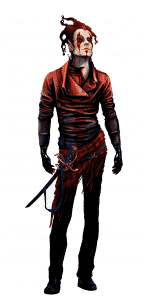
Character Class: Bard
The living embodiment of “YOLO,” the jester Jungian archetype is about living in the moment, enjoying humor, and making the world a lighter place in general.
They don’t like boredom, or stagnation, and are utterly terrified of being the boring one. They’re the type of people that make fart noises when the lights go out at summer camp to keep everyone awake.
Thanks, Jeremy, now I have to praise the lord with one less hour of sleep in the morning.
Common Cliches
The bard is a very versatile class, but one thing all of its many faces have in common is this stereotype of being the happy-go-lucky master of fun and adventure.
Every bard I’ve ever seen at the table (with the exception of one who will serve as my uncharacteristic character for this section) have fit this mold. They sing, they dance, they use the strangest instrument they can find because it somehow makes them unique or something.
No, Greg, you can’t give out bardic inspiration with a nose flute. It’s just not happening.
How to Mix it Up
What I want to impart to people who play bards is that not all inspirational music needs to be happy. And there doesn’t even need to be music to consider the casting components to a bard’s spells/abilities. You just need to have some kind of performance aspect to fulfill the requirement. Enter the Dirgedamper.
The Dirgedamper is a creepy sort of bard who uses primarily charms to get their way. Need a guard to let you through? Charm. Need a party member to give you a healing potion? Charm. Need an NPC loyal to the big bad evil guy to give you his help? Charm. This won’t endear you to anyone. But it will make for a lot of interesting roleplaying moments. Ones where the other characters actively avoid the bard for fear of becoming the next target of their compulsion spells.
In order to play the Dirgedamper to the fullest, be sure that your “performance” aspects are hand gestures as part of the “poetry” you recite to use your abilities. Nothing is better for motivation than promising to watch worms crawl into the corpses of your teammates when they die horrible deaths. Making these lines into subtle, dark rhyming couplets is a plus.
The Lover
back to archetypes | classes
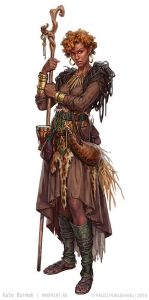
Character Class: Druid
The druid represents the lover Jungian archetype, which is chiefly concerned with cultivating intimacy. I say “cultivate” because Druids surround themselves with what they love at all times. After all, their powers come from their intimate connection with nature and the spirits that imbue it with life.
This is not to say that druids cannot also be loving and generous companions to their adventuring party, but with the companionship of other beings comes the possibility of being rejected. Humans, elves, and dwarves can be judgmental and quick to dismiss the spiritual connections the druid has with nature. The lover gives all of themselves and forms attachments easily. Losing those connections is tantamount to death.
A lover’s greatest fear, after all, is being alone.
Common Cliches
The druid class is intrinsically tied to nature. All their spells and abilities revolve around trees, water, fire, or bears. Well, mostly bears. Druids really like bears. They summon bears, they become bears… you get the point.
The fact is that this innate tie to nature makes it difficult to play a druid that doesn’t use it as their main personality trait. After all, some classes were specifically designed to work within certain parameters. The cleric has to worship a god, the paladin has to be lawful good, the bard has to perform, etc.
So, there’s a problem when separating these elements of the class, but the cool part is that you don’t have to break the class mechanics in order to break the personality traits associated with it.
How to Mix it Up
This is where the Fire Marshall comes in. This build actually hates nature, and will actively and wantonly burn things to the ground if they find it offensive. Druids can’t wear metal armor to cast spells. So, instead of using the cliche iron bark, we wear armor made out of stone.
Yup, stone. It doesn’t conduct heat. It’s heavy. Protective. And it looks badass. When the fire marshall gets into combat, they will find the exits, seal them off, then proceed to toss a few flaming spheres into the environment and laugh as everything burns around them.
Throw in a spell that lets you breathe smoke or something, and you’ve got it made. I might have given the sorcerer shit for being a pyro, but a druid pyro is just funny.
The Explorer
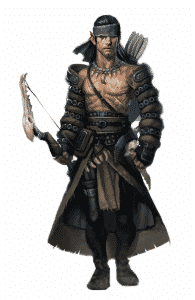
back to archetypes | classes
Character Class: Ranger
The explorer archetype is all about freedom, discovery, and authenticity. They hate being devoid of substance, being constrained, or being forced to conform to things.
So, it’s hardly a surprise that the ranger class is linked to this archetype more than all the others. After all, this is the class that brought you Aragorn, Drizzt Do’Urden, and Katniss Everdeen.
These three broke the mold, actively rebelling against their destiny and the bond of their society. Thus, inadvertently creating a new conformity within this article. Heh, I guess you can’t predict everything!
Common Cliches
The ranger as a class in most roleplaying games is the embodiment of many a nature lover’s fantasy. Although they don’t reach the point of near fetishism like the aforementioned druid.
They get a few nature-based spells, they get an animal companion, they get a choice of fighting styles, and they know how to navigate the woods better than anyone. Most every ranger I’ve ever seen played has the same sort of hang-up when it comes to playing this class. They take it upon themselves to shun society, live off the land, and become self-sufficient.
While this is great for someone looking to play as a doomsday prepper who was proven right, it’s not the end-all-beat-all way to go about roleplaying as a rugged person who likes Cabelas.
How to Mix it Up
To break the mold of breaking the mold, let’s look at the Civil Savant. He or she is a ranger who specializes in navigating the “untamed” parts of the cities they inhabit. Take their favored terrain as urban environments, favored enemy: humanoid.
This ranger is going to be making a lot of contacts, and some of them aren’t reputable, so the Civil Savant is going to focus on taking out people who cross them. The ultimate goal of our ranger is to create a society, not end one. Pull your party into your plans, whatever those may be.
Perhaps you want to run a gambling ring, an underground fighting championship, or a secret society dedicated to preserving peace in the underbelly of the city. The city is your oyster, and the people you meet are the pearl.
The Magician
back to archetypes | classes
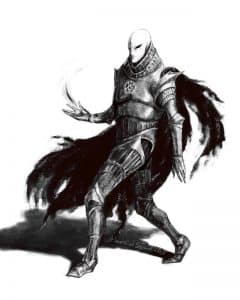
Character Class: Warlock
The magician Jungian archetype is primarily concerned with making dreams come true. Less in the vein of literal magic, and more in the way of understanding the way things really work, and using every possible method to achieve their goals.
They are the people who see something they want, and they don’t stop until it’s in their hand. They excel at finding win-win situations, but they can sometimes fall prey to becoming manipulative. That sure happens a lot in Dungeons and Dragons.
Seriously, it’s like a twisted version of Murphy’s Law: if there’s a way to exploit it, it will be exploited.
Common Cliches
The warlock is another magical class, but they gain their powers from something “greater than themselves,” this might be a deity, a demon, or some kind of weird cosmological anomaly. Usually, though, it’s a demon.
People who play warlocks love to have their leashes pulled on for some reason. Maybe they’re all closet (or not so closet) submissives? Either way, generally when I see a warlock played at the table, it’s an edgelord trying to secretly fulfill the wishes of their master and subsequently gain amazing powers for themselves.
This may or may not include a plan to double-cross the party at some point to chase their ultimate dream of being the most important character at the table. Because, damn it, I deserve to be the best for all my hard work of throwing bolts of dark energy and laughing in the dark to the sound of the voices in my head!
How to Mix it Up
There’s nothing wrong with having dreams or ambitions, but the warlock, and subsequently, the players who run them, can quickly spiral into a conflated ego that will stop at nothing to bend the party to their will. But what if you could play a warlock whose desire is to complete the wishes of others?
The Wishmaster is a warlock who wants to meet the deepest desires of those they adventure with. The Wishmaster begins with a very particular patron: a genie. This genie is trapped within a prison or vessel of some kind. And they can only be freed once a certain number of wishes have been fulfilled. Only, the genie needs the Wishmaster’s help to do it. Now that you have the patron, time to get some persuasion skills, and an array of spells that will serve to remove obstacles. Take as many utility spells as you can like fly, banishment, unseen servant, invisibility, etc.
When encountering a problem, make sure you get your party members to phrase their request in the form of wishes, otherwise it doesn’t count! Make sure, also, you confirm the wish with “as you wish.” Depending on how you say this, it’ll either inspire confidence or disconcernment. For more fun, mix it up a bit. Don’t let your party know your end game, even if it’s benevolent. This makes sure you’re never in the spotlight until it’s too late.
The Innocent
back to archetypes | classes
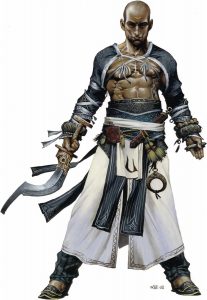
Character Class: Monk
The innocents of the world are the people who don’t care how the system works. They just want to be happy, and they don’t really care what they have to do to achieve that, even if it’s impossible.
They want to be themselves, do things that make them happy, and be rewarded for working toward their goals. The primary device the innocent uses to keep them going is nostalgia. Memories of happier days, and simpler times are always buzzing around in the head of an innocent archetypal character.
In the most traditional sense, an innocent is seen as a dreamer. Sometimes, a utopian. But innocents can also be the boring kind: saints and mystics with an idea of how the world should work, and who operate as if anyone doing anything different are wrong.
Common Cliches
It’s this second brand of innocent that the monk class falls into. Stick-up-the-ass syndrome abounds in this class that focuses on mysticism, tranquility, and pummeling their foes with sweet martial arts moves.
Generally, monks I’ve seen are played as poorly implemented Asian stereotypes focused on the monastic traditions of the shaolin monks. They focus on stoicism and remain pretty scarce when major things happen in the lives of other characters. Except when the situation serves as a vessel to convert the character to their worldview.
Sometimes their “wisdom” ends up being some vague and useless fortune cookie slogan like “you cannot defeat that which cannot win.” Do you know what that means? Me neither. It sounds like wisdom, but it doesn’t actually contribute anything to the narrative.
How to Mix it Up
In order to break this mold, the first thing we have to do is break tradition. The monk I present is nowhere near a monastery, and any “mystical powers” they end up with are explained by either worldly magic, or extreme training.
The Heartbeater is a monk with something to lose. They suffer, and their suffering gives them the strength to carry on. Perhaps the Heartbeater has a family member who is sick, but the Heartbeater doesn’t have the money to get them treatment. Adventuring and training your body to be your weapon seems like a pretty cheap and effective way to get the things they need to gain their happiness.
Try taking abilities that trade penalties for bonuses, or traits/backgrounds that give you something that ties you down like a best friend or a family. The more weaknesses this monk has, and the more vulnerable they feel, the more training they do to compensate. Their fiery passion becomes the catalyst for their rise to greatness.
The Hero
back to archetypes | classes
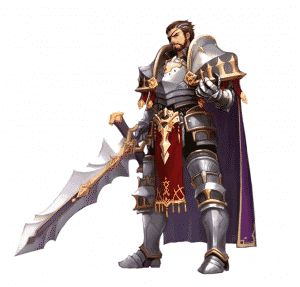
Character Class: Paladin
This is one of those Jungian archetype meets Dungeons and Dragons character class combinations that comes off as a true no-brainer. The hero archetype is the one that constantly puts itself in danger to prove itself.
They give in easily to being called cowards, and they respond the to the weakness in others like a ten-year-old-child who just discovered their little brother is playing their XBox. This archetype is constantly pushing itself to the point of mastery, but it often leaves others in the dust because of it.
Sure, they can be nice people, and paladins are supposed to be “lawful good” alignment, but the problem with the hero is that their goodness often comes from a place of arrogance or self-righteousness.
Common Cliches
It’s not hard to imagine, then, that a paladin would fit right into this mold. After all, they are unwavering devotees of their gods. They are meant to be the champions of said gods, and the architects of the destruction of evil.
There’s very little room in the world for paladins who are lukewarm at best, it’s either all or nothing on the good scale, and that tends to be the problem with most paladin players. They confuse the lawful aspect of lawful good for the actual laws of the land rather than the principles they hold most dear, and the good part of their alignment as a call to help everyone regardless of whether or not they deserve it.
Sometimes, this “lawful stupid” view can make for good roleplaying, but more often than not, the player ends up doing a few more good deeds than they should have and putting their party at risk of starvation both morally, and financially.
How to Mix it Up
To combat this, we’re going to flip the script on the definition of “lawful good.” Honestly, I could write an entire other piece on the tired and broken Dungeons and Dragons alignment system, but for now we’ll have to settle. When I think of the axis of law, I think more in terms of principle than of actual law. To be lawful, one needs a set of moral guidelines they understand, and follow religiously. That does not mean it has to be a religion! On the good side, to be “good” in this case, means to be selfless. To think of the good of other people. So we’re looking at a principled and selfless character.
Now, to blow your mind, I give you our new archetype: the Inglorious Bastard.
The Inglorious Bastard doesn’t care about upholding some religious dogma. They care about stopping people from getting hurt, and they do so in whatever way gets the job done, even if that means breaking some laws or some skulls. The Inglorious Bastard clings to two principles: they will beat you fairly, and they will not kill you.
Outside of those two things, everything is allowed. They will go out of their way to save even a criminal if the criminal is about to die, but they are not going to let an innocent get hurt. Even at the cost of their own safety. This means that they stick to their principles, and they are selfless. To improve the effect, make yourself as scary as possible. How often do you see “holy warriors” sporting spikes, chains, and skulls?
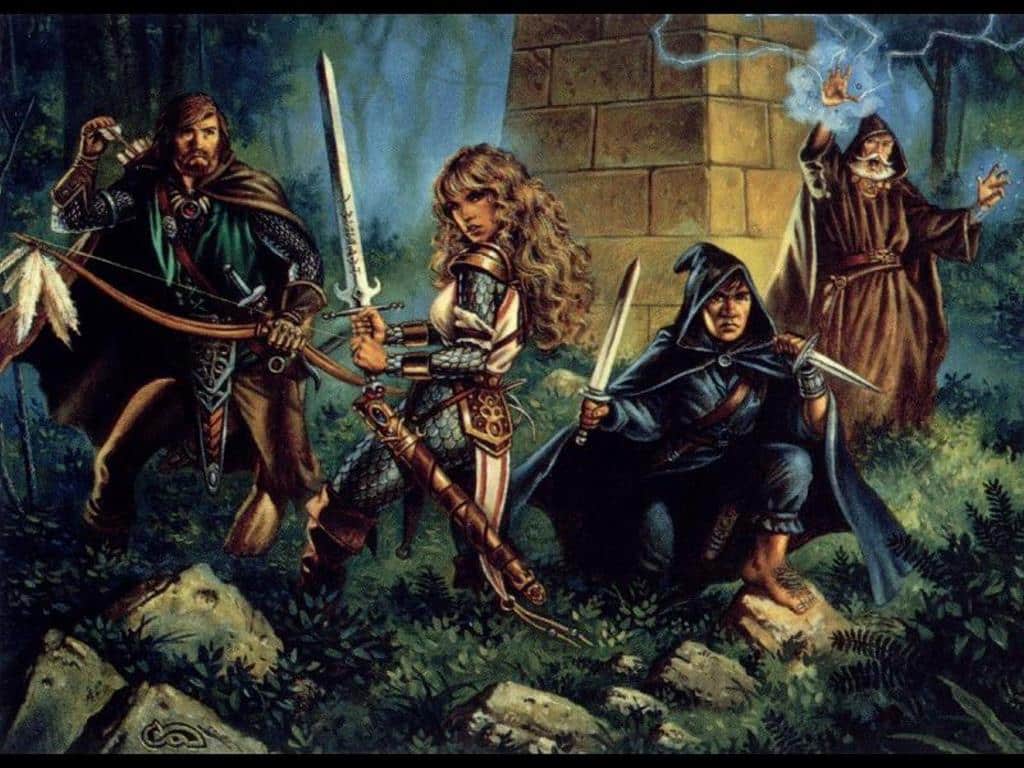
Well you got the sage wrong (IMO)
ALTHOUGH saggio means wise, and druids use wisdom so I think it would HAVE to be a wisdom class but whatever. Still how did you miss the Magician being the wizard?
Might be my Latin privilege but Mago means wizard so in my language it’s hard to go astray in that direction.
This is very mind-opening, really an offbeat session of psychoanalysis, with clear clues as to why i tend to choose to play certain class(es) time and again:) Thanks for writing!
(The Druid part is a little confusing, though.)